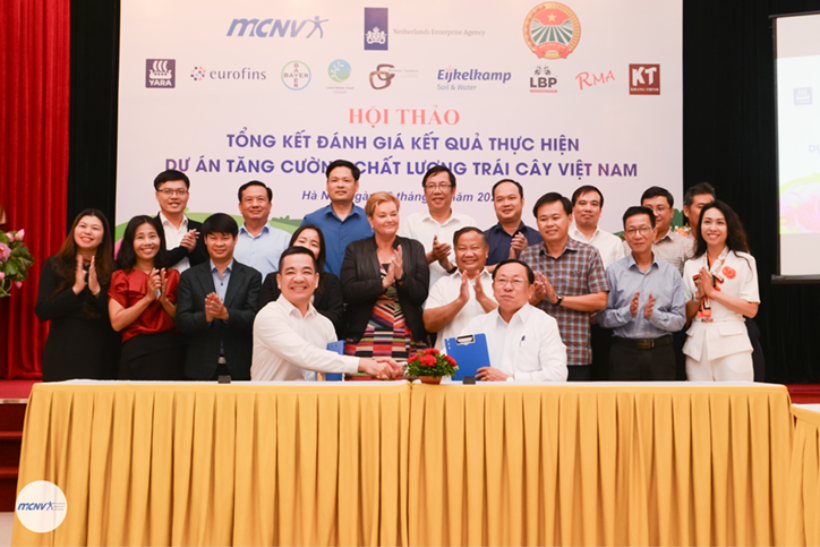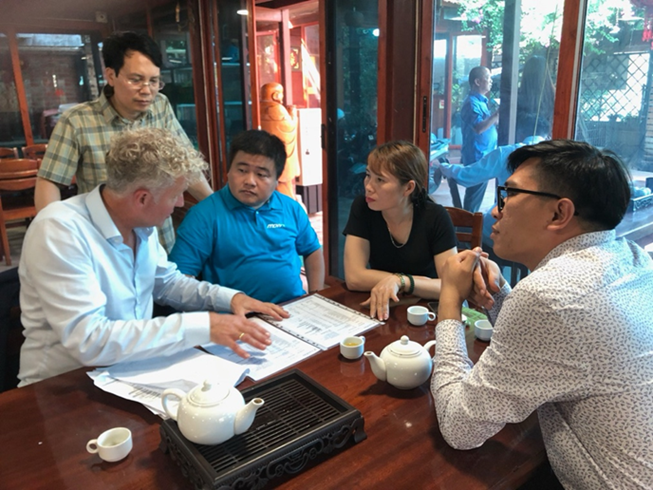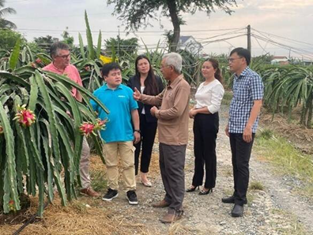Structural impact of NL-VN Fruit Project: Introducing soil testing to farmers in Vietnam
Vietnam is listed as one of the most vulnerable countries when it comes to the impact of climate change. Drought and salinization have negative impacts on soils and the agricultural production levels. Investing in a healthy soil is one the most effective measures to achieve resilient farming systems. High levels of ground water limit the aeration of the rootzone and reduce the biological activity, which can generate nutrient deficiency and bio physical stress of the crops. This can result in pressure pests and diseases. For that reason, control of groundwater levels is recommended to make the soil suitable for deep root growth and optimal uptake of nutrients.

The percentage of soil organic carbon can be increased by green cover crops, compost and organic fertilizers. In the future, measuring soil organic carbon is expected to give farmers in Vietnam access to the market of carbon credits once they can organize themselves in producers groups. By analyzing the soil of their orchards, farmers get insight into the actual soil fertility status. The soil report serves as the basis for proper application of organic and mineral fertilizers while in Vietnam soil testing is not common among farmers. Encouraging farmers to be more accurate in the fertilization of their fruit trees was one of the key interventions in the Impact Cluster Project Quality Improvement of Tropical Fruits in Vietnam. An important impact of the project is that soil testing will be promoted at large scale.
Improving quality of tropical fruits in Vietnam
The Impact Cluster Project Quality Improvement of Tropical Fruits in Vietnam was a project funded by the Dutch government and implemented by leading partners: Medical Committee Netherlands Vietnam (MCNV) and Vietnam Farmers’ Union (VNFU) in close collaboration with business consortium of Dutch and Vietnamese companies including YARA, Bayer and Eurofins Vietnam, Eurofins Netherlands, Eijkelkamp Soil & Water, RMA and LBP. These stakeholders supported and worked with Vietnamese farmers in the provinces Dong Thap (mango), Ben Tre (pomelo), Long An and Binh Thuan (both dragon fruit) to help improve their practices, especially on fertilization, soil and irrigation management and crop protection. Bureau Leeters and Land Water Food Consult offered support on market aspects and technical content. The project ended in December 2024 and has opened a new chapter of business cooperation, firstly with an MoU signed by Vietnam Farmers’ Union and Eurofins Vietnam.
Innovations in soil testing methods
More than 100 years ago, Dutch farmers organizations established a laboratory to get independent advice about the soil fertility and the required amounts of fertilizers, based on the actual needs of the crops. Soil testing became a common practice among the farmers. During the growing season, farmers also check the soil fertility and analyze tissues to discover nutrient deficiencies on time. In the meantime, the lab became part of Eurofins. However, the heart of innovations of agro-services are still based in the Netherlands. In the past soil fertility indicators were analyzed by wet chemical analysis of samples, which is time consuming and costly. Eurofins Netherlands implemented two broad spectrum tests (Near Infrared Spectroscopy (NIRS) and 0.01 M CaCl2 with ICP-MS) to analyze not only soil but also forage, crop, manure and compost.
Over the years, this method has become a certified standard in the Netherlands, enabling the lab to process 2000 samples per day, with a relatively small device. In the meantime, NIRS has been rolled out in many countries in Europe, but also in China and New Zealand. Fortunately, this project on Quality Improvement of Tropical Fruits in Vietnam supported the investment in NIRS in Vietnam. This facility made it possible for Vietnamese farmers to access this affordable soil testing method.

Results of the project
The project offered farmers technical training on soil and crop management. Project partners gave their fertilization recommendations based on the soil reports, leading to optimized fertilization management, less investment in nitrogen and phosphorus and more focus on, for example, calcium and magnesium and some micronutrients. As a result, the mango farmer Mr. Hon, who hosted the demo-plot, reduced his fertilizer use by 30 % while he doubled his yield.
In addition, the quality was more uniform, the shelf-life extended with 4-10 days and the peel was free of residues, thus clean. The project promoted integrated pest management and paid much attention to healthy soils. Farmers exchanged their experiences in study-groups. The guidance of the companies made the farmers clear that overusing inputs has a negative impact on the quality of the fruit and soils, and moreover, also affects the environment.
These encouraging results and impacts of the project have made farmers very positive about the integrated approach and asked for continuation. This Impact Cluster Project on Quality Improvement of Tropical Fruits in Vietnam showed that soil testing is beneficial for farmers, and that accurate fertilization can lead the way to a modern and climate resilient agriculture in Vietnam.

Knowledge dissemination is crucial for scaling up
The farmers in various provinces in Vietnam showed interest in soil testing. The Impact Cluster Project on Quality Improvement of Tropical Fruits in Vietnam was a pilot showing the benefits of soil testing in the provinces in the Mekong Delta. The signed MoU by Vietnam Farmers’ Union and Eurofins Vietnam will roll out soil testing services to the 10,2 million farmers in 63 provinces in the country, as a spinoff of this project.
It took 100 years to get Dutch farmers to do soil testing on a regular basis. By taking the first step, VNFU and Eurofins emphasized the need for collaboration to make the change happen. A successful implementation needs to be combined with efforts of the private sector and the government. Capacity building and demo’s, showing the benefits for the specific crops and local farming practices, require a strategic plan involving the most important public and private stakeholders. Based on such a program, extension officers of the Ministry of Agriculture and Rural Development as wella s advisors of agro-companies should be trained in reading the soil testing reports and the translation into fertilization recommendations.
More information on the project
- A video on the Vietnam Tropical Fruits Quality Improvement Project on YouTube.com
- Vietnam and the Netherlands working together to improve the quality of tropical fruit
Contact information
Do you have any questions for the agriculture department? Please send an email to HAN-LVVN@minbuza.nl. For the latest updates, news funding opportunities and more, follow us on X @AgroVietnam and LinkedIn Netherlands Agricultural Network in Vietnam.